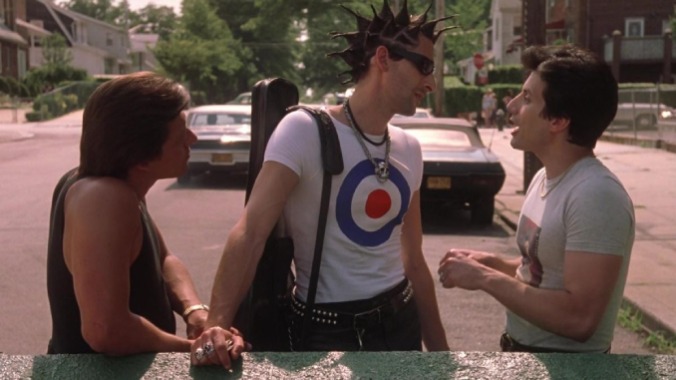
Welcome to The Weekend Watch, a weekly column focusing on a movie—new, old or somewhere in between, but out either in theaters or on a streaming service near you—worth catching on a cozy Friday night or a lazy Sunday morning. Comments welcome!
Spike Lee’s shaggy, Scorsese-like summer of ‘77 is a treatise on repression masquerading as a serial killer story. Summer of Sam offers the Son of Sam murders as the catalyst for a New York City full of heat waves (naturally), punks, disco dancers, mobsters, cops, gay-for-pay performers and musical montages. Because a murderer keeps blowing away parked couples trying to canoodle in their cars, everyone is scared of having sex—or of having the wrong kind of sex. It’s in this intersection of a rapidly changing pop culture and its conservative foundation that Lee’s sprawling film is at its most insightful, uncomfortable and engaging. It’s streaming now on the Criterion Channel (I promise to shake up where I’m watching these, but man, they just added a ton of new stuff for May), and it’s worth devoting the two-and-a-half hours to.
Summer of Sam wasn’t warmly received upon its release in 1999, but its brutal dive into the coexisting id of CBGB and Studio 54 is a heart-pounding, face-first confrontation with a highly specific era of Americana.
It’s ironic then, that one of the most striking things about Summer of Sam is its Brit-punk cosplayer Ritchie (Adrien Brody). Decked out in chains, a spiked dog collar, safety pins, glued hair and the tightest Union Jack tee you’ve ever seen, Ritchie even speaks with a faux Cockney accent when we first see him link back up with his old Italian Bronx-mates. His sexuality is flexible, but his musical and fashion taste is rigid in this new direction. On the other side of the culture clash is a never-better John Leguizamo, playing Ritchie’s old pal Vinny. Vinny’s frantic and paranoid as he cheats on his wife (Mira Sorvino), pops pills, and frets about the .44 Caliber Killer after a relatively close call. And yet, nothing can stop his constant search for women more suited for his more perverse sexual needs (at least, perverse in his closed-off mind; he thinks one’s wife should only debase herself by doing it “regular”).
Criterion describes the pair as a “wannabe Tony Manero” and a “wannabe Sid Vicious,” which pretty much sums it up: Both Ritchie and Vinny want to escape their stagnant lives through these exciting subcultures that don’t quite fit into their upbringing. Whether they’re flaunting massive collars and white suits or bleach-blond mohawks, they’re playing dress-up to get somewhere that feels more real. All the while, they’re surrounded by the people who represent good ol’ salt-of-the-earth NYC—and who fear anyone and anything that might deviate from the status quo. There are the semi-made men, ashamed that Vinny would so flagrantly run around on his wife. There are the cops, tied up with the mobsters while they hunt monsters. There are the lookie-loos and conspiracists, who’d suspect their neighbors even if there wasn’t a serial killer running around.
All the interracial hatred, homophobia, sports talk, and frank sex that you’d expect from Lee’s work fills each vibrant frame with sweaty life. And that’s not even mentioning the killer cast of character actors, which includes Bebe Neuwirth, Michael Rispoli, Ben Gazzara and Patti LuPone. Everyone’s getting hot under the collar, and hates that they can’t calm down. The only people keeping their cool are, surprisingly, those most in danger of getting targeted by David Berkowitz. Sorvino’s Dionna and Jennifer Esposito’s Ruby (girlfriend of Ritchie) keep it together, slowly growing to respectively reject and accept their men for who they truly are.
And yes, there are still some incredibly stilted moments. The washed-out, off-putting sequences in Berkowitz’s home are almost Fincher-esque in their dirty, half-funny squalor, while a lot of the dialogue is tinny compared to the raw emotions coursing underneath. My gut wants to blame Lee’s co-writers Victor Colicchio and Michael Imperioli. It was the first writing credit for both actors (who appear in bit parts, Imperioli most memorably as gay strip joint operator Midnite), and neither went on to write much else. It’s not quite “I must be loyle to my capo,” but watching Vinny scream out his window at Son of Sam isn’t much better. But you never know with screenwriting—this could all be Spike Lee’s fault.
As an aside, Imperioli “resorted to tapping into otherworldly means” to get this script made by consulting a witch he knew. At least it wasn’t a talking dog!
Somewhere between a prestige sign o’ the times period piece and a pitch-black After Hours nightmare, Summer of Sam is a textured and messy drama filled with stressed-out, destabilized people who only needed a reason to freak out on each other. Along the way, The Who battles disco on the airwaves, New York blacks out, and the Yankees win! Summer of Sam is no Do the Right Thing, but you can see how Spike Lee grew in the decade since his 1989 masterpiece, and how he returned to his highly personal observations about his fellow man. Culture might change, but people never do.
Jacob Oller is Movies Editor at Paste Magazine. You can follow him on Twitter at @jacoboller.
For all the latest movie news, reviews, lists and features, follow @PasteMovies.